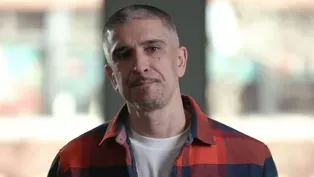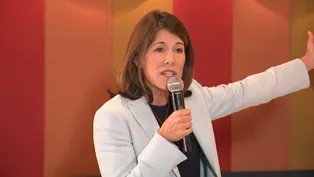
Hidden Risk
Clip: Season 6 Episode 6 | 8m 24sVideo has Closed Captions
Women with dense breasts are at greater risk of developing breast cancer.
Many women who are at greater risk of developing breast cancer are often the same women for whom detection through a mammogram is more difficult. And if additional screening is not conducted, the consequences for some can be life-threatening.

Hidden Risk
Clip: Season 6 Episode 6 | 8m 24sVideo has Closed Captions
Many women who are at greater risk of developing breast cancer are often the same women for whom detection through a mammogram is more difficult. And if additional screening is not conducted, the consequences for some can be life-threatening.
How to Watch Rhode Island PBS Weekly
Rhode Island PBS Weekly is available to stream on pbs.org and the free PBS App, available on iPhone, Apple TV, Android TV, Android smartphones, Amazon Fire TV, Amazon Fire Tablet, Roku, Samsung Smart TV, and Vizio.
Providing Support for PBS.org
Learn Moreabout PBS online sponsorshipr face there was something, but she couldn't say, and then they brought somebody in and said they had to do a biopsy.
- [Michelle] Michele Winn was recently diagnosed with breast cancer for the second time.
Her first diagnosis was eight years ago.
- They found something back when I was 50, and they immediately took me in for an ultrasound.
They just saw a shadow, but they couldn't, they had to make sure with the ultrasound and that's when that all got sent into motion and it was definitely there.
- [Michelle] Winn went through treatment and was grateful her cancer was found in stage one.
She's been diligent about getting her mammogram every year.
She was surprised to learn this year that she once again had breast cancer, this time on her other breast.
Winn did not realize having dense breasts increased her risk of breast cancer.
- They did tell me they were dense, but again, I heard everybody had dense, so I didn't really take too much stock in it, but it's real.
- [Michelle] The breasts are made up of fatty tissue and dense tissue, which includes the milk glands, milk ducks, and supportive tissue.
A person with dense breasts has more dense tissue than fatty tissue.
- We can't change our breast density.
- Dr. Jennifer Gass is the Director of the Breast Health Center for Care New England.
She's also a professor of surgery at Brown University.
- How do you go about detecting if you have dense breasts?
Can you do a self exam or you really need a professional to do that mammogram to find out?
- It's a mammographic finding, and so a breast self exam won't tell you.
- [Michelle] About half of women 40 and older have dense breasts, which can make mammograms harder to read.
- The fatty tissue is helpful in the breast because on x-ray, mammogram, the fatty tissue is very translucent, and so when the mammogram is translucent, then the density pops out like a light bulb.
But when the mammogram is dense, the brilliance of that light bulb is masked by all of that density.
- [Michelle] Dr. Gass pointed to an image from the CDC website.
On the left, it shows a mostly fatty breast, compared to the one on the right, which is a dense breast.
- The white tissue is the dense tissue, and the challenge here is that any one of these little white nodules could be the beginning of a cancer, but when it's masked in the background of all of this patchy density, you can't pick it up as a cancer.
- [Michelle] According to the Susan G Komen Breast Cancer Foundation, women with very dense breasts are four to five times more likely to get breast cancer than those with fatty breasts.
It's a sobering statistic for Charles Kelley.
His wife, Ann, died of breast cancer in 2019.
- It was quite a shock to her and all of us when she found a lump in her breast.
She said, "Well, it can't be anything serious because I've just got a clean bill of health from a mammogram."
- [Michelle] Ann Kelley's doctor recommended she get an ultrasound, which found a tumor in her breast.
When the mother of two asked why the tumor did not show up on a mammogram, the doctor said it was because she had dense breasts.
- She, being a very logical CPA and business person, said, "Well, why hasn't someone told me this years ago that I should have had some alternative procedures?"
We talked about it and that set her off on not only fighting her own fight with cancer, but also fighting to make the public, and particularly women, aware that they needed to be an advocate for themselves.
- [Michelle] And Kelley helped write and pass a law in Rhode Island that requires healthcare facilities that perform mammograms to notify patients if they have dense breasts.
It took effect in 2014.
- Patients receive a letter about their mammogram result, and on that mammogram result letter was an additional paragraph about your breast density, and that if you were dense, that you should be asking your provider for additional imaging such as ultrasound or MRI.
- [Michelle] We asked Care New England for a sample of what a mammography report in Rhode Island looks like for patients with dense breasts.
It includes a notice that, quote, "In some people with dense tissue, other imaging tests, in addition to a mammogram, may help find cancers."
A state law took effect this year that requires insurance companies to cover additional screening needed for patients with dense breasts.
- Before this legislation, my office spent some time working to ensure there would be coverage, so there was unnecessary work effort to ensure that the patient could get the test that she needed, so now hopefully with this legislation, it'll be more streamlined, and really, the woman should be able to advocate for herself.
- [Michelle] Michele Winn says she's learned how important it is to advocate for your health.
Her cancer was found early and she says her prognosis looks good, but she says she did not know she could have benefited from additional screening over the years because she has dense breasts.
- That's why this time when I went in and they said there was something there, I was angry.
I was like, "Why haven't I been getting an ultrasound all this time if my doctor recommends it now?"
There were two schools of thought with whether or not an ultrasound was necessary with every mammogram.
Again, they might find something with every ultrasound and go in unnecessarily, but in this case, I'm glad they did.
- [Michelle] Doctors say ultrasounds and MRIs can lead to false alarms and involve unnecessary biopsies.
It's a concern Kelley heard when his late wife was working to pass the legislation, but he believes it's worth it.
- I grew up around strong women.
My wife was a strong woman.
They wanna know what's going on with their body and their health and it's a lot more anxiety prone to be dealing with surgery and radiation and chemotherapy than just finding out that you maybe should get a little biopsy.
- [Michelle] Kelley has no doubt that Ann has saved lives and continues to make an impact.
- Many people have said to me, "I never knew that I needed these additional procedures."
Couple of people have actually said, "We found a tumor early, stage one."
And if they hadn't found it, it could have developed and metastasized and been a real problem for that person, so there's nothing more rewarding or heartening or a greater tribute to Ann's efforts than those women.
Video has Closed Captions
A Rhode Island man’s journey for redemption after decades in prison. (7m 52s)
Video has Closed Captions
Campaign finance reports show who could be considering a run for Rhode Island governor. (4m 52s)
Providing Support for PBS.org
Learn Moreabout PBS online sponsorship












